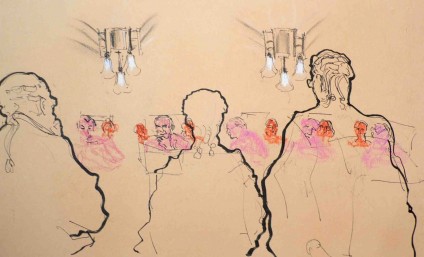Convicted of serious crimes but still claiming to be innocent, prisoners who cannot succeed in having their convictions overturned by the Court of Appeal Criminal Division (CACD) are desperate to find help. Their only recourse is to apply to the Criminal Cases Review Commission (CCRC), but legal aid is very limited for lawyers preparing applications, and the few good solicitors willing to do the extra, often unpaid work to achieve referrals by the CCRC to the CACD are snowed under with demands for their services.
To fill this gap in provision of a much needed service, pro bono university based organisations, now numbering more than 30, have sprung up across the UK. Following the example of American innocence projects, these are run voluntarily by students under the direction of academic staff and with the support of local lawyers. The first of these was established by Dr Michael Naughton at the University of Bristol. In 2004, Dr Naughton realised that innocence projects would benefit from resources provided centrally, and he set up the Innocence Network UK (INUK).
Michael Naughton proved to be an energetic and effective organiser, and an inspiring speaker who filled many students with an enthusiastic desire to investigate the cases of innocent prisoners, in the hope of overturning their convictions. Ably assisted by Dr Gabe Tan, he organised two training conferences each year. Naughton and Tan published a useful booklet, Claims of Innocence, which was distributed free to prisoners and students working in innocence projects.
INUK issued ‘protocols’ and other guidance, designed to ensure that the work of its member projects followed INUK’s guiding principles and was of high quality. It acted as a clearing house for applications from prisoners and supplied cases to member projects. For each case INUK assembled files and assessed whether the case fulfilled the criteria making it eligible for review by a member innocence project. Projects agreed to take only cases assigned to them by INUK.
Many projects, including the one at which I work at Sheffield University, subscribed fully to INUK’s principles and valued the services provided by INUK, and so we were saddened to receive Michael Naughton’s recent announcement that INUK had decided to cease acting as a network. But the announcement was not unexpected. Almost since its inception, INUK had been prepared to expel members who were thought not to be following its approved ways of working or who presented arguments considered not to be consistent with its principles. Competent, experienced individuals who wished to establish innocence projects in their own institutions were, if they were deemed to hold principles believed to be inconsistent with INUK’s, or undermining of its authority, were declared personae non gratae. Some formed projects that were not connected to INUK.
For most of us working in or with innocence projects, any differences of opinion or approach between those that were or were not members of INUK did not appear to impact on the quality of their work. Naughton suggested that there was a fundamental difference between projects which conducted only ‘paper’ or ‘desk top’ reviews of cases, but the truth is that most of the work carried out by projects consists detailed examination of case files, rather than activities like scene of crime visits or interviewing witnesses. The examination of the voluminous records which comprise any post appeal case is most likely to result in attempts to obtain disclosure of yet more paper, in the hope of obtaining records of evidence undisclosed previously, which might hold the (technically) fresh evidence needed for an appeal against conviction to succeed. Any project whose findings pointed to the need for other forms of fresh evidence – DNA retesting of exhibits or expert opinions on some other issue previously unconsidered, for example – would undoubtedly follow up such leads as best they could. Naughton’s distinction cannot be sustained.
Projects were simply reviewing cases and trying to help those who they believed to be innocent as a consequence of their review. They did so with enthusiasm but also with varying degrees of competence. This is not surprising. The concept of innocence projects was new in the UK. No one knew how much staff time was required for management of projects, what difficulties students would encounter and how competent they would prove to be, or what facilities and finance projects would need.
Carried forward by forward by the intoxication of the idea that bright young students could use their talents to give real help to individuals suffering from terrible misfortunes, problems were perhaps ignored: who would want to dampen such enthusiasm?
Of course, student commitment is not enough. Students have little or no prior knowledge of the criminal justice system. Confronted by boxes full of papers, they cannot recognise what these records mean or how they fit into the case. Even when they have catalogued, summarised and indexed everything, they have work out how they relate to police investigations, defence case preparation, and the appeal system. Throughout they need guidance from individuals who have enough experience of what is really quite an odd corner of the criminal justice system. Those of us directing innocence projects are still working out how to enable students to review cases thoroughly and efficiently, exploiting the students’ commitment and enabling them to bring fresh views and intelligence to bear on solving problems, and come up with the new idea which just might lead to the fresh evidence needed for a possible success in the CACD.
But so far cases are not flooding from innocence projects into the CACD (only from Bristol and Cardiff Innocence Projects so far). This is hard work. Cases are, by definition, difficult ones. But students bring to these cases resources not available elsewhere in the criminal justice system. No one working under the restrictions of legal aid funding or the budgetary constraints of institutions such as the CCRC is likely to do the detailed work that students are prepared to do. But with improved systems in place for investigations and guidance and training of students, innocence projects across the UK can have a useful, productive future.
At this stage, INUK has reported a problem which I and many others find difficult to understand:
The eligible cases are drying up. In the last year only a few of the couple of hundred applications that we have assessed have been deemed eligible.
As a result, INUK is unable to provide a key part of services it previously offered – the supply of cases to projects. There appears to be no shortage of alleged miscarriages of justice. Inside Justice reports it has been asked to investigate 816 cases since 2010. Campaigning and support organisations which are members of United Against Injustice know of many cases which need assistance. Joint Enterprise Not Guilty by Association claims to be in contact with nearly 500 people claiming to be wrongly convicted.
So the problem must be with INUK’s assessment of eligibility. Cases are deemed eligible for possible assignment to an Innocent Project if the applicant claims to be completely innocent and not involved in the crime of which they were convicted. Someone who claimed to be innocent of murder, for example, would not be eligible if they admitted manslaughter (or even some form of encouragement, in a joint enterprise case). But recently the following addition (dated August 2014) was made.
Please note fulfilling the above eligibility criteria does not guarantee that your case will be accepted by INUK. We will also consider the merits of the case, overall strength of the evidence that led to the conviction, and whether there are viable lines of enquiry an innocence project can investigate during the eligibility assessment process.
This to me appears to be a commitment to the prejudgement of cases. In his introduction to The Criminal Cases Review Commission: hope for the innocent?, Naughton criticised the CCRC for conducting ‘reviews’ of cases rather than investigating them. The distinction was between reviewing existing case files and actively seeking new lines of inquiry and following them up. At the time, I agreed with his criticism in my contribution to the same book, although I no longer believe this to be generally true of the CCRC. But it now appears that INUK is, and has been, prejudging cases in the same way. Hence the ‘drying up’ of eligible cases.
This causes a specific problem for universities which run assessed modules which are part of undergraduate courses and attached to innocence projects. Students who have chosen these modules need cases to work on, otherwise they cannot submit work for assessment and will receive lower grades as a result. They would have legitimate cause for complaint if that happened. Projects at Sheffield Hallam University and the University of Sheffield both face this problem. The directors of these projects agree that there is no need for prior assessment of cases in the way described by INUK. Each project can assess its own cases.
This approach is part of a vision for the future of innocence projects in the UK, in which they are no longer asked to submit to the rules of a central organisation over which they have no control. Whatever networking system or organisation develops, it will be inclusive rather than exclusive, democratic rather than subject to charismatic leadership, co-operative and mutually supportive rather than centralised. Cases will be supplied by existing organisations or through direct applications to projects, checked in a clearing system to avoid duplication of work. Training conferences will be organised by different institutions and materials will be shared freely. New or floundering projects will be able to seek advice and support.
The future shape of the movement is yet to be decided. We expect to take advantage of the CCRC’s welcome recognition of the potential for projects to submit well investigated cases, and willingness to collaborate. The most practical co-operative organisation may be a regional one, to reduce travel and expense. Projects may specialise, perhaps by types of case such as joint enterprise, or historic sexual abuse. The future looks bright and full of possibility.
Contact HallamCriminalAppeals@shu.ac.uk








